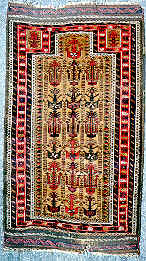Prayer Rugs

Muslims are often seen kneeling and prostrating on small embroidered rugs, called "prayer rugs." For those unfamiliar with the use of these rugs, they may look like small "oriental carpets," or simply nice pieces of embroidery.
During Islamic prayers, worshippers bow, kneel, and prostrate on the ground
in humility before God. The only requirement in Islam is that prayers be
performed in an area that is clean. Prayer rugs are not universally used by
Muslims, nor specifically required in Islam. But they have become a traditional
way for many Muslims to ensure the cleanliness of their place of prayer, and to
create an isolated space to concentrate in prayer.
Prayer rugs are usually about one meter long, just enough for an adult to fit
comfortably when kneeling or prostrating.
Modern, commercially-produced rugs are often made of silk or cotton.
While some rugs are made in solid colors, they are usually adorned. The
designs are often geometric, floral, arabesque, or depict Islamic landmarks such
as the Ka'aba in Mecca or Al-Aqsa Mosque in Jerusalem. They are usually designed
so that the rug has a definite "top" and "bottom" -- the bottom is where the
worshipper stands, and the top points towards the direction of prayer.
When the time for prayer comes, the worshipper lays the rug on the ground, so
that the top points towards the direction of Mecca, Saudi Arabia. After prayer,
the rug is immediately folded or rolled, and put away for the next use. This
ensures that the rug remains clean.
The Arabic word for a prayer rug is "sajada," which comes from the same root
word (SJD) as "masjed" (mosque) and "sujud" (prostration).